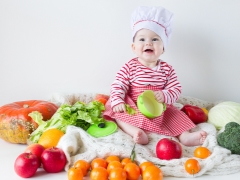Menu of a child at 9 months: the basis of the diet and nutrition principles
Nine month old baby I have already tried many products that caring parents prepare for it daily, changing tastes and experimenting with children's recipes. Let's analyze what changes in the baby’s menu at 9 months and how to build a diet for children at this age.
Features of the diet of a 9 month old baby
- A kid at this age is less in need of my mother's milk or an adapted mixture, but doctors do not recommend abolishing them. Let the crumb on breastfeeding continue to be applied to her mother's breast early in the morning and before going to bed at night, and also wash down new dishes with women's milk. It is recommended that the child-isthrist continue to give the mixture after waking up and overnight.
- The list of products introduced into the diet of babies breastfed and babies-artificials, at 9 months of age was the same. The difference is only in the volume of some dishes. Artificially fed to their children are given more because of the earlier start of complementary foods and the increased need for minerals and vitamins. We are talking about mashed potatoes and fruit juices, cottage cheese, yolk and dairy drinks.
What foods can be added to the diet?
The kids, who were lured according to the Komarovsky scheme, begin to feed in the same way as the others. Babies who are bottle-fed or babies who, for a good reason, started to be fed earlier than 6 months of age, are not introduced into new products at 9 months, but only increase the number of products and make food more diverse due to new combinations of products.
But the baby, who until six months was fed only mother's milk, at 9 months of age is introduced such new products:
- Yolk. It is usually given in the second feeding with porridge.
- Cottage cheese. It is added to the fourth feeding to the fruit puree.
- Sour-milk drinks. They are also given in the fourth meal along with fruit, cottage cheese and children's cookiesthus forming an afternoon snack.
- Cow's milk. On it cook porridge.
How much should a baby eat?
To determine the total daily amount of food for a nine-month baby, you need to know the weight of the baby. Dividing the mass of the toddler by 8 or 9, you will know how much approximately a child of this age should eat per day.
Recommendations for feeding foods:
Product | Maximum consumption in 9 months | |
Breast-feeding | Artificial feeding | |
Vegetable puree | 180 g | 180 g |
Dairy-free or milk porridge | 200 g | 200 g |
Fruit puree | 70 g | 80 g |
Vegetable oil | 5 g | 5 g |
5 g | 5 g | |
Fruit juice | 50 ml | 70 ml |
Cracker, Cookies | 5 g | 5 g |
Wheat bread | 5 g | 5 g |
Meat Puree | 50 g | 50 g |
Cottage cheese | 30 g | 40 g |
Yolk | 1/4 | 1/2 |
Dairy products | 150 ml | 200 ml |
Diet
A nine-month baby still, as at 7 or 8 months, has five meals a day. They are evenly distributed throughout the day at intervals of 3 to 4 hours.
For example, if at the first feeding the baby wakes up at 6 am, then the following meals will be at about 10 am, at 2 pm, at 6 pm and the last one at 10 pm If a child has breakfast at 8 o'clock, he will have a second meal at about 11-12 o'clock, lunch at 15-16 o'clock, the fourth meal at 18-19 o'clock, and feeding at night - at 22-23 o'clock.
Sample menu
For babies who are exclusively breastfed until 6 months of age, at 9 months the menu will look like this:
Meal | Products and dishes |
The first | Mother's milk |
Second | Porridge without milk or milk up to 200 g, butter up to 5 g, fruit puree 30 g, a quarter of yolk |
Third | Mashed vegetables or soup up to 180 g, vegetable oil up to 5 g, meat puree up to 50 g, a piece of wheat bread, fruit juice up to 50 ml |
Fourth | Puree of fruit 40 g, cottage cheese up to 30 g, biscuits or crackers, kefir or yogurt up to 150 ml |
Fifth | Mother's milk |
In a nine-month-old baby, whose acquaintance with lure occurred at 4-5 months of age due to insufficient amount of mother's milk from mom, the menu for the day will be as follows:
Meal | Products and dishes |
The first | Mother's milk |
Second | Porridge with milk up to 200 g, butter up to 5 g, half of chicken yolk, fruit puree 40 g |
Third | Vegetable puree up to 180 g, vegetable oil up to 5 g, meat puree up to 50 g, a slice of wheat bread, fruit juice up to 70 ml |
Fourth | Fruit puree up to 40 g, cottage cheese up to 40 g, baby biscuits or crackers, fermented milk drink up to 200 ml |
Fifth | Mother's milk |
An artificially fed baby’s day menu at nine months will look like this:
Meal | Products and dishes |
The first | Adapted mix |
Second | Porridge with milk up to 200 g, butter up to 5 g, half of chicken yolk, fruit puree 40 g |
Third | Vegetable puree up to 180 g, vegetable oil up to 5 g, meat puree up to 50 g, a slice of wheat bread, fruit juice up to 70 ml |
Fourth | Fruit puree up to 40 g, cottage cheese up to 40 g, baby biscuits or crackers, fermented milk drink up to 200 ml |
Fifth | Adapted mix |
Tips
Be careful with new products. Although the crumb has already met with a very large number of new dishes, there is always the risk of a reaction to any food product. Begin to give everything new from a small amount in the morning feeding and evaluate the reaction in the evening. If the skin and digestion of the crumbs are all right, you can increase the portion.

Consider the following nuances:
- Gradually accustom the child to eat not only homogenized food, but also finely chopped. For example, rarely offer crumbs of vegetable purees, replacing them with soups, in which vegetables will be just mashed with a fork.
- Fruit puree can be given in the full recommended for this age volume in the fourth feeding, mixing it with cottage cheese, but more often part of the fruit is added to the second feeding (in porridge).
- Feed your baby always fresh food. If you are buying ready-made baby food for the crumbs, check the expiration dates on the packaging and observe storage conditions.
- Do not insist if the baby is against any new product. Come up with new combinations that crumbs will like and make its menu varied and tasty.
Do you think it's worth give vitamins to the baby in this age? The answer to this question you will learn from our article.












